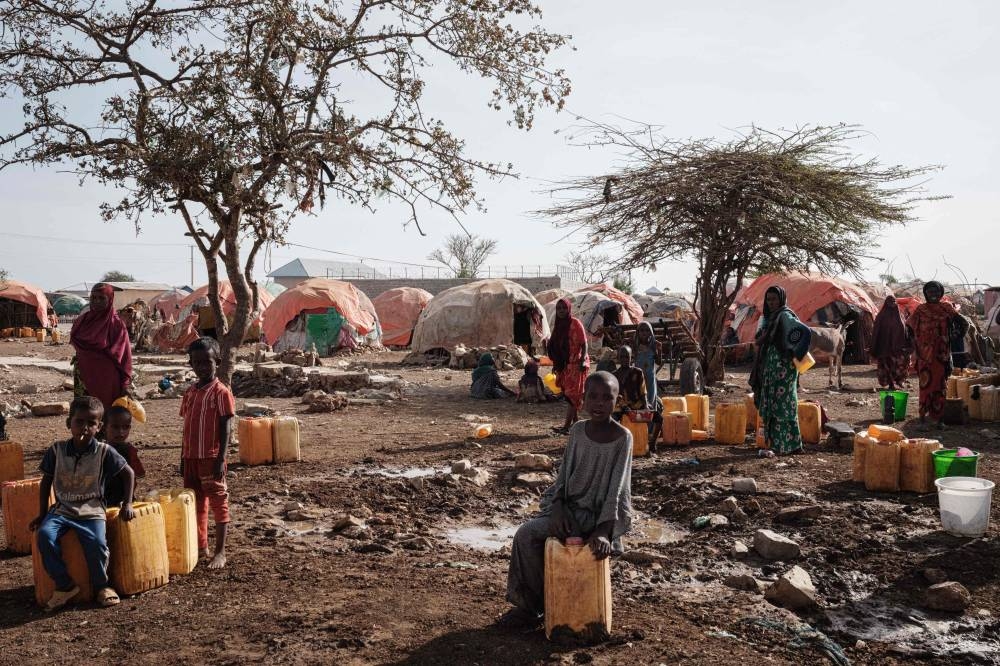NAIROBI, Sept 5 — The United Nations warned today that Somalia was on the brink of famine for the second time in just over a decade, and that time was running out to save lives in the drought-ravaged country.
“Famine is at the door and we are receiving a final warning,” UN humanitarian chief Martin Griffiths told a press conference in the Somali capital Mogadishu.
“The unprecedented failure of four consecutive rainy seasons, decades of conflict, mass displacement, severe economic issues are pushing many people to... the brink of famine.” Millions of people are at risk of starvation in Somalia and its neighbours in the Horn of Africa including Ethiopia and Kenya which are in the grip of the worst drought in four decades after four failed rainy seasons wiped out livestock and crops.
A food and nutrition report has “concrete indications” that famine will strike Baidoa and Burhakaba in the Bay region of south-central Somalia between October and December, said the head of the UN Office for the Coordination of Humanitarian Affairs (OCHA), who began a visit to the country on Thursday.
“I’ve been shocked to my core these past few days by the level of pain and suffering we see so many Somalis enduring,” he added.
“We are in the last moment of the 11th hour to save lives.” Humanitarian agencies have been ringing alarm bells for months and say the situation in the Horn of Africa is likely to deteriorate with a likely fifth failed rainy season in the offing.

‘Worst fears now a reality’
Griffiths said the situation was worse than during Somalia’s last famine in 2011 when 260,000 people died, more than half of them children under the age of six.
The UN’s World Food Programme (WFP) last month said the number of people at risk of starvation across the Horn had increased to 22 million.
“Our worst fears for Somalia are now a reality: Famine is imminent if funds do not arrive immediately,” WFP executive director David Beasley said on Twitter.
“The world MUST act now — this is a global call to action.” In Somalia alone, the number of people facing crisis hunger levels is 7.8 million, or about half the population, while around a million have fled their homes on a desperate quest for food and water, UN agencies say.
Griffiths described scenes of heart-rending suffering during a visit to Baidoa, describing it as the epicentre of the crisis where he saw “children so malnourished they could barely speak” or cry.
He said 1.5 million children across the country were at risk of acute malnutrition by October if nothing changed.
Conflict-wracked Somalia is considered one of the most vulnerable to climate change but is particularly ill-equipped to cope with the crisis.
A deadly insurgency by the radical Islamist Al-Shabaab group for more than a decade and a half against the fragile federal government is limiting humanitarian access to many areas.
A long-running political crisis also diverted attention away from the drought, but new President Hassan Sheikh Mohamud used his inauguration speech in June to appeal for international help to stave off disaster.
In recent years, increasingly extreme droughts and floods have added to the devastation caused by a locust invasion and the Covid-19 pandemic.
The UN’s World Meteorological Organization (WMO) has said the Horn was likely facing a fifth straight failed rainy season over the months of October to December.
‘Sleepwalking’ to catastrophe — At the start of this year, the WFP had put the number of people facing hunger across the Horn at 13 million, and appealed for donors to open their wallets.
Funds were initially slow in coming, with Russia’s invasion of Ukraine among other crises drawing attention from the disaster in the Horn, humanitarian workers said.
The war in Ukraine has also sent global food and fuel prices soaring, making aid delivery more expensive.
In June, British charity Save the Children had issued an alert that the international community was “sleepwalking towards another catastrophic famine” in Somalia.
OCHA has said the March-May 2022 rainy season was the driest on record in the last 70 years, and 2020-2022 had surpassed “the horrific droughts in both 2010-2011 and 2016-2017 in duration and severity”.
“An estimated 2.3 million girls and boys are at imminent risk of violence, exploitation, abuse, neglect, and death from severe acute malnutrition as result of food and nutrition crisis across Somalia,” it said in August.
In 2017, more than six million people in Somalia, more than half of them children, needed aid because of a prolonged drought across East Africa.
But early humanitarian action averted famine that year. — AFP






















